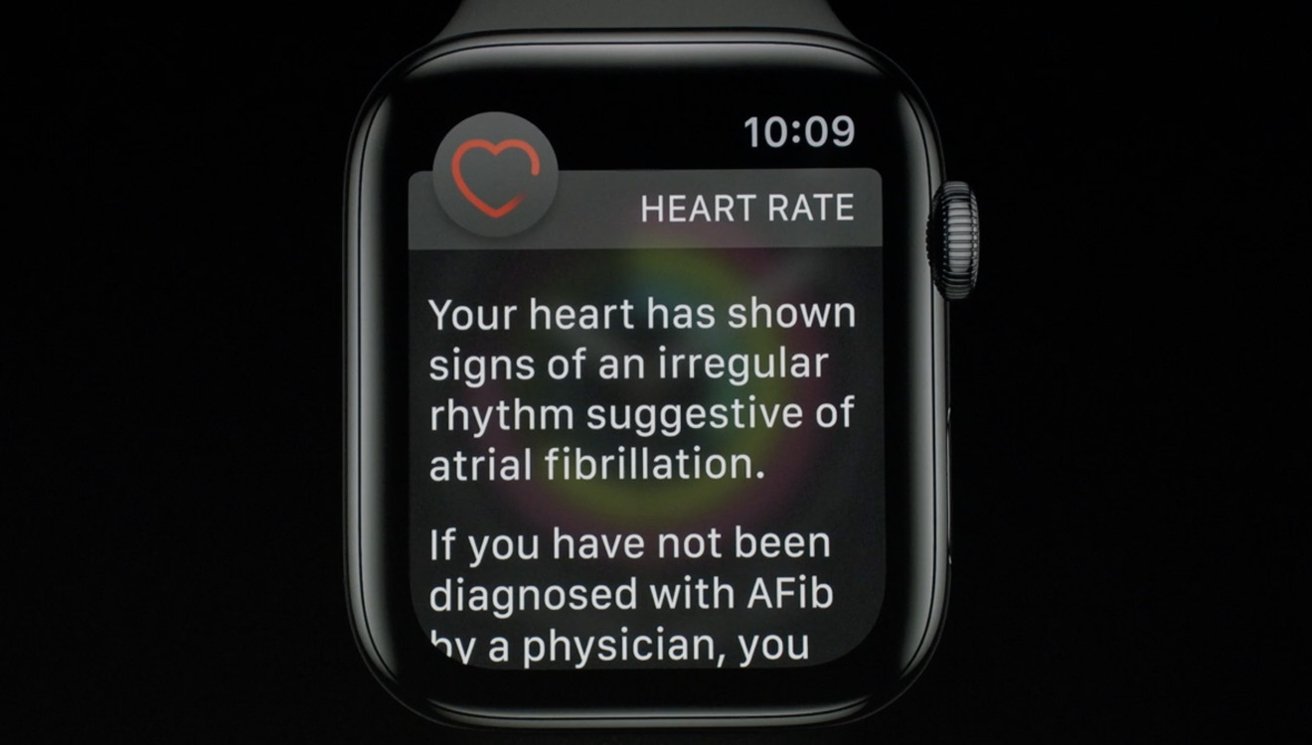Woman credits Apple Watch with saving life after AFib alert
Apple Watch continues a streak of assisting wearers facing potentially life-threatening situations, with the device recently credited with alerting a 70-year-old user of a serious heart condition.

In June, Yolie De Leon of Arizona said she was about to head out for a walk when she received an alert on her Apple Watch, reports La Crosse Tribune.
"It said my heart rate was at 174," De Leon said. "It said, You are an AFib,' and said, Call your doctor immediately.'"
AFib, or atrial fibrillation, is an irregular heart rate often characterized by rapid beats that can lead to heart failure or stroke.
Doctors at a local hospital confirmed the diagnosis provided by De Leon's Apple Watch.
The report fails to mention the Apple Watch model owned by De Leon, but Apple's wearable has touted AFib detection since 2018. Watch regularly collects analyzes data from its optical heart rate sensor, allowing the device to form a broad overview of a wearer's heart health. Users are alerted when irregularities are detected, including higher than normal heart rates and unusual rhythms.
Apple Watch added to its quiver of heart health functions with ECG capabilities in Apple Watch Series 4, allowing it and later models to deliver more accurate heart rate readings. Last year, Apple Watch Series 6 launched with an optical blood oxygen sensor that provides valuable insight into saturation levels and could help detect conditions like sleep apnea.
Another Watch feature, fall detection, recently made headlines for potentially saving the lives of two users who took hard falls. Earlier this month, the feature automatically called authorities after being triggered in a car accident involving a Missouri sheriff's deputy.
Apple is rumored to introduce non-invasive blood glucose monitoring with a next-generation Watch model, a technology widely viewed as a "holy grail" of modern medical science. The company reportedly has a team dedicated to the project and filed for a number of patents related to the function, though it remains unclear if the technology is ripe for public release.
Read on AppleInsider

In June, Yolie De Leon of Arizona said she was about to head out for a walk when she received an alert on her Apple Watch, reports La Crosse Tribune.
"It said my heart rate was at 174," De Leon said. "It said, You are an AFib,' and said, Call your doctor immediately.'"
AFib, or atrial fibrillation, is an irregular heart rate often characterized by rapid beats that can lead to heart failure or stroke.
Doctors at a local hospital confirmed the diagnosis provided by De Leon's Apple Watch.
The report fails to mention the Apple Watch model owned by De Leon, but Apple's wearable has touted AFib detection since 2018. Watch regularly collects analyzes data from its optical heart rate sensor, allowing the device to form a broad overview of a wearer's heart health. Users are alerted when irregularities are detected, including higher than normal heart rates and unusual rhythms.
Apple Watch added to its quiver of heart health functions with ECG capabilities in Apple Watch Series 4, allowing it and later models to deliver more accurate heart rate readings. Last year, Apple Watch Series 6 launched with an optical blood oxygen sensor that provides valuable insight into saturation levels and could help detect conditions like sleep apnea.
Another Watch feature, fall detection, recently made headlines for potentially saving the lives of two users who took hard falls. Earlier this month, the feature automatically called authorities after being triggered in a car accident involving a Missouri sheriff's deputy.
Apple is rumored to introduce non-invasive blood glucose monitoring with a next-generation Watch model, a technology widely viewed as a "holy grail" of modern medical science. The company reportedly has a team dedicated to the project and filed for a number of patents related to the function, though it remains unclear if the technology is ripe for public release.
Read on AppleInsider

Comments
Funny thing about Afib is that you don't really know that you have it. I.e., you don't really notice that your heart is beating fast. Although it does make you feel very sluggish. So I guess you could notice it if you were educated about the symptoms.
About that last part, I can't find the exact wording right now, but I seem to remember reading something about how if it gets this kind of reading a certain number of times within a day or whatever then you'll get the notification. So it's not just if it gets a high reading once. I got the notification one day when I had been experiencing noticeable heart rate irregularity all day. Got the notification late in the evening. In the data it shows me five different readings that it collected over about an 8 hour period before it gave me the notification. And yes I have since seen my doctor about it and things seem to be fine for now
But all in all I think it is just based on heart rate data that it collects methodically and notifies you that it "MAY BE" AFib if it gets what it thinks is enough data over a period of time to make that suggestion.
Drinking too much can do that. And it also creates a heart condition.
As I understand it, it is two phased:
"Definition of life-threatening: capable of causing death; potentially fatal"
https://www.merriam-webster.com/dictionary/life-threatening
He meant an immediately acute problem such as a heart attack. A-Fib tends to be more like High Blood pressure or diabetes that, over time, will also generate condition that kills you. Many people live with those conditions for years without knowing it. It's why the doctor checks your blood pressure every time he sees you -- it's quick, cheap, easy and saves lives -- and now the Apple Watch is doing the same for A-Fib.